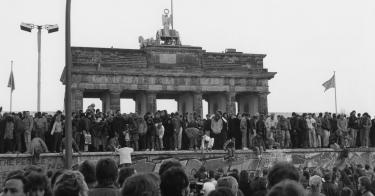The fall of the Berlin Wall 29 years ago was one of the most consequential events of the 20th century, exposing the Soviet Union as a corrupt, weak “empire” and effectively ending the Cold War. But it did not happen overnight.
The fall of the wall was preceded by decades of political tyranny and economic backwardness. By January 1989, there was scarcely a ruble’s worth of difference between a Third World nation and a member of the Warsaw Pact, the group of Eastern and Central European nations that served at Moscow’s pleasure.
While the West enjoyed prosperity and personal freedom, the East had fallen into an economic and political morass. Eastern Europe’s industrial sector was a monument to bureaucratic inefficiency and waste.
The once impregnable Iron Curtain was breached by modern communications and technology, allowing the people of Eastern Europe to see how the other half of Europe lived. Increasingly, Poles, Hungarians, Czechs, East Germans and other peoples demanded reform, not only in the marketplace but in the realm of human rights and civil liberties.
Described as a “year of miracles,” 1989 began with the dissident Czech playwright Vaclav Havel in jail and ended with him as the president of Czechoslovakia. But at the start of the year, Soviet influence from Prague to Warsaw to Budapest seemed secure. The East German communist boss Erich Honecker boasted that the Berlin Wall would stand for an additional 100 years.
Just 10 months later, on November 9, a tidal wave of East Germans poured across the West Berlin border when travel restrictions were lifted, and the Berlin Wall came tumbling down.
Part of the reason lay in geography. Although separate and distinct countries, Poland, Hungary, East Germany and Czechoslovakia formed a tight little region. Resentment, frustration and hope were all inevitable in this cluster of states with the deepest cultural ties with Western Europe.
Another reason was the abandonment of communism by communists. The communist leaders of Eastern Europe candidly acknowledged, “We no longer believe in Marxism-Leninism.” Without the glue of ideology, the communist façade of power and authority cracked and the people’s natural desire for freedom, dammed up for more than 40 years, burst forth.
A further reason for the slide of Soviet communism into oblivion was its inability to deliver the goods. When Mikhail Gorbachev was named the general secretary of the Soviet communist party in 1985, he took command of “a totally stagnant state dominated by a corrupt totalitarian party.”
Gorbachev must be credited for his decision not to interfere in the affairs of other communist regimes. The Soviet leader announced that he rejected the (Leonid) Brezhnev Doctrine, under which Moscow would take action if necessary to ensure that a communist state remained a communist state.
The leader most responsible for the fall of the Wall of course was President Ronald Reagan, who stood in front of the Brandenburg Gate in June 1987 and issued a direct challenge to the Soviets, “Mr. Gorbachev, tear down this wall!” Barely two years later, it collapsed because of the Reagan Doctrine, which applied economic, political and strategic pressure (including the Strategic Defense Initiative) on Moscow. Democracy triumphed in the Cold War, Reagan wrote in his autobiography, because it was a battle of ideas — “between one system that gave preeminence to the state and another that gave preeminence to the individual and freedom.”
Lech Walesa, the founder of the Polish trade union movement that challenged the communist government of Poland and prepared the way for the end of communism throughout Eastern and Central Europe, put his feelings about President Reagan simply, “We in Poland … owe him our liberty.” As do the tens of millions behind the Iron Curtain caught up in one of the longest conflicts in history — the Cold War.
This piece originally appeared in The Post and Courier



